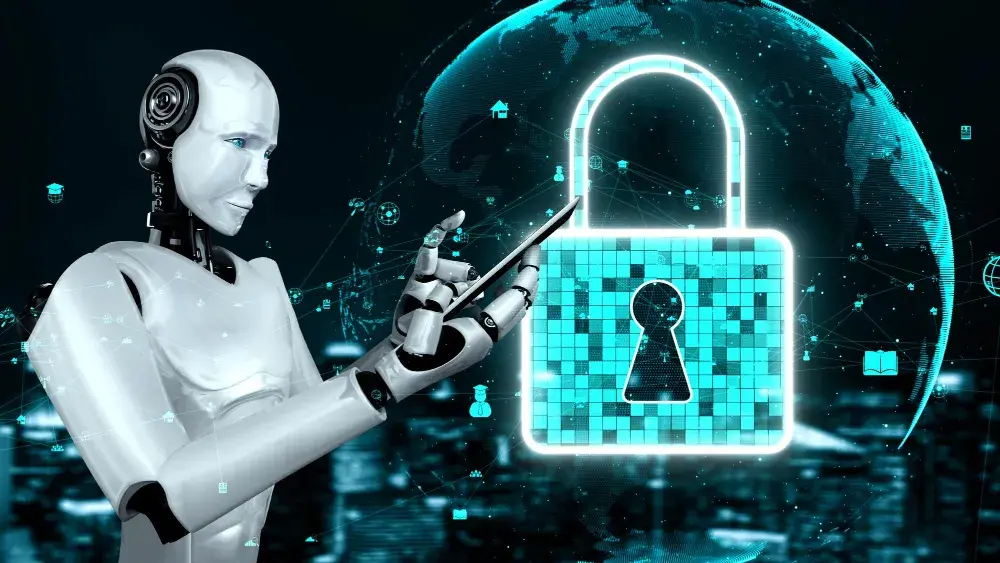- Blog
- May 29, 2024
Artificial Intelligence in Cybersecurity

- Blog
- May 29, 2024
Artificial Intelligence in Cybersecurity
Introduction
In the evolving digital landscape, the proliferation of cyber threats is on the rise. In such times, prioritizing the protection of your online information is paramount. Artificial Intelligence (AI) emerges as a potent ally in combatting these threats. With its advanced capabilities to detect and prevent malicious attacks far more effectively than traditional technologies, AI instills a renewed sense of hope in bolstering cybersecurity measures. In this blog article, we explore the transformative impact of AI in transforming and strengthening cybersecurity.
Understanding AI and Cybersecurity
Artificial Intelligence, or AI, is when computers try to act like humans. They can learn things, think about problems, and even fix mistakes they make. In the realm of cybersecurity, AI plays a crucial role in fortifying the protection of our online data against cyber threats. For instance, AI can discern anomalous behavior within networks or identify patterns indicative of potential attacks. By using AI, we enhance the resilience and sophistication of our cybersecurity defenses, thereby safeguarding our data from the nefarious activities of hackers and cybercriminals.
Protecting our computers, networks, and software from digital threats is the essence of cybersecurity. These threats manifest in various forms, including viruses, scams, and complex hacks orchestrated by adept hackers. When AI intersects with cybersecurity, it amplifies the defense capabilities significantly. AI possesses the capacity to quickly analyze vast volumes of data, proactively identifying threats before they inflict damage. Moreover, AI can adapt and evolve based on emerging attack patterns, continuously enhancing our defense mechanisms. By integrating AI into cybersecurity measures, we gain a competitive edge in staying ahead of cyber threats, thus bolstering the security of our digital realm with greater efficacy.
AI-Driven Cybersecurity Solutions
In the dynamic realm of digital security, intelligent computer programs are spearheading innovation. They’re reshaping how businesses defend against online threats, powered by the capabilities of artificial intelligence. These advanced technologies are revolutionizing digital security, enabling organizations to outmaneuver cybercriminals and fortify their defenses effectively.
- Real-Time Threat Detection: Machine learning algorithms lie at the heart of AI-driven cybersecurity, enabling the detection of threats in real-time. These algorithms can go through huge amounts of data, finding complex patterns and differences that humans might miss. By continuously analyzing network traffic, system logs, and user behaviors, AI algorithms can quickly identify and mitigate potential security breaches, minimizing the risk of damage to digital assets.
- Enhanced Identity Management: AI-driven identity management solutions are transforming authentication processes, with biometric logins emerging as an important feature of modern security protocols. Using biometric data like fingerprints, facial recognition, or voice patterns, AI systems offer strong ways to confirm identities, making it harder for unauthorized people to gain access. This shift towards biometric authentication not only enhances security but also streamlines user experiences, offering a seamless and frictionless login process.
- Proactive Vulnerability Management: Predictive analytics, driven by AI, empower organizations to take a proactive stance on vulnerability management. Through the analysis of historical data and current trends, AI algorithms can forecast potential security weaknesses before they become targets for malicious actors. This proactive strategy allows organizations to fortify their defenses ahead of time by addressing vulnerabilities and shoring up weak points in their digital infrastructure. By embracing proactive vulnerability management, businesses can notably diminish their vulnerability to cyberattacks, safeguarding critical data and ensuring uninterrupted business operations.
Benefits of AI in Cybersecurity
Integrating artificial intelligence (AI) into cybersecurity brings many advantages, making digital defense more robust and effective. Let’s delve into how AI enhances cybersecurity in simpler terms:
- Faster Detection and Response: When AI and cybersecurity join forces, they become like superheroes, spotting bad guys (cyber threats) at lightning speed. AI can analyze tons of information quickly to catch any signs of trouble, allowing us to act fast and stop cyberattacks before they cause damage.
- Reduced Mistakes in Spotting Threats: Imagine AI as a smart student in a cybersecurity class. It learns from its mistakes and becomes better at telling what’s a real threat and what’s not. This means fewer false alarms, so security experts can focus on real problems instead of wasting time on harmless things.
- Adapts to Changes Easily: Think of AI as a flexible athlete in a cybersecurity game. As a company grows and changes its digital stuff, AI can adapt to keep everything safe. So, whether a company gets bigger or starts using new technologies, AI cybersecurity can adjust to protect it better.
- Always Learning and Improving: AI cybersecurity is like a never-ending learner. It keeps studying and getting smarter, just like students in school. It’s always on the lookout for new types of threats, making sure our digital world stays safe, even as hackers try new tricks.
Challenges and Considerations
While AI brings significant benefits to cybersecurity, its implementation also presents several challenges and considerations that need careful attention:
- Complexity of AI Systems: Integrating AI into cybersecurity isn’t as simple as flipping a switch. AI systems are complex and require specialized knowledge to implement and maintain effectively. Just like building a sophisticated machine, setting up AI for cybersecurity involves understanding how it works, configuring it to fit the organization’s needs, and continuously updating and optimizing its performance. This complexity can pose challenges for organizations lacking the necessary expertise or resources to navigate the intricacies of AI technology.
Furthermore, AI algorithms and models need constant tuning and refinement to remain effective against evolving cyber threats. This ongoing maintenance demands a dedicated team of skilled professionals who can keep pace with advancements in AI technology and adapt cybersecurity strategies accordingly.
- Ethical Considerations: As the integration of AI into cybersecurity operations continues to advance, ethical dilemmas emerge as significant concerns. Foremost among these is the issue of privacy and data protection. AI algorithms often rely on extensive datasets to learn and make informed decisions, prompting ethical inquiries into the responsible collection, storage, and utilization of sensitive information. Organizations must ensure that their utilization of AI aligns with pertinent privacy regulations, safeguarding individuals’ data from unauthorized access or misuse.
Moreover, the deployment of AI in cybersecurity introduces the potential for biases or unintended consequences that may disproportionately affect individuals or communities. Mitigating algorithmic biases and promoting fairness in decision-making processes are critical ethical imperatives for organizations leveraging AI technologies. By addressing these ethical concerns proactively, organizations can uphold integrity, transparency, and accountability in their AI-driven cybersecurity endeavors.
- Human Oversight: While AI holds tremendous potential for automating cybersecurity tasks and augmenting human capabilities, it’s essential to recognize that AI systems are not infallible. Human oversight is indispensable to prevent AI from overstepping its bounds or making critical errors that could compromise security.
Human experts play a vital role in monitoring AI systems, interpreting their outputs, and making informed decisions based on contextual understanding and ethical judgment. This oversight ensures that AI operates within established boundaries, adheres to ethical guidelines, and complements human intelligence rather than supplanting it entirely.
The Future of AI in Cybersecurity
As society delves deeper into the digital era, the significance of Artificial Intelligence (AI) in cybersecurity is not merely growing—it’s evolving into a fundamental pillar of defense strategies against cyber threats. The swift progression of technology has facilitated the development of AI systems that transcend mere reactivity, embracing a proactive approach to security.
- Predictive Capabilities: AI is moving towards predictive security measures. By analyzing patterns and anomalies in vast datasets, AI can forecast potential cyber-attacks before they occur. This predictive capability allows organizations to implement defensive strategies in advance, reducing the risk of successful breaches.
- Adaptive Defense Mechanisms: The AI systems of the future will be equipped with adaptive defense mechanisms. These systems will learn from each attack, continuously improving their detection algorithms and response strategies. This adaptability ensures that AI defenses evolve at a pace that matches or exceeds that of cyber threats.
- Automated Security: Automation in cybersecurity is set to increase, with AI taking on more responsibilities that were traditionally handled by human experts. From monitoring network traffic to responding to incidents, AI will automate these processes, increasing efficiency and freeing up human resources for more complex tasks.
- Impact on Jobs and Skills: The integration of AI in cybersecurity will have a profound impact on the job market and the skills required in the sector. There will be a growing demand for professionals who can design, manage, and maintain AI systems. Traditional cybersecurity roles will evolve, requiring a blend of technical expertise and an understanding of AI principles.
- Ethical AI: As AI takes on a more significant role, the importance of ethical AI comes to the forefront. Ensuring that AI systems make decisions that are fair, unbiased, and transparent will be crucial. Cybersecurity professionals will need to be versed in ethical considerations and governance related to AI.
- Collaboration and Sharing: The future will likely see increased collaboration between AI systems across different organizations and sectors. Sharing information about threats and defense mechanisms can lead to a more robust collective security posture.
- Quantum Resilience: With the advent of quantum computing, AI will play a key role in developing quantum-resistant encryption and security protocols. As quantum computers have the potential to break traditional encryption, AI will be essential in creating systems that can withstand quantum attacks.
The market for AI in cybersecurity is expected to grow from around 24 billion USD in 2023 to approximately 134 billion USD by 2030
The trajectory of AI in cybersecurity is brimming with dynamism and promise. It possesses the transformative potential to revolutionize the safeguarding of our digital assets and infrastructure. As AI technologies advance, they are poised to play an integral role in our collaborative cybersecurity endeavors, furnishing sophisticated protection against the incessantly evolving landscape of cyber threats.
Conclusion
In summary, AI is reshaping cybersecurity by enhancing threat detection, response speed, and adaptability to evolving risks. Even though it brings advantages, there are still hurdles such as complexity and ethical concerns to deal with. However, the future of AI in cybersecurity looks promising, with predictive capabilities, automated defenses, and quantum resilience on the horizon. As AI becomes integral to cybersecurity, collaboration, and ethical principles will be vital in safeguarding our digital world against ever-evolving threats.




